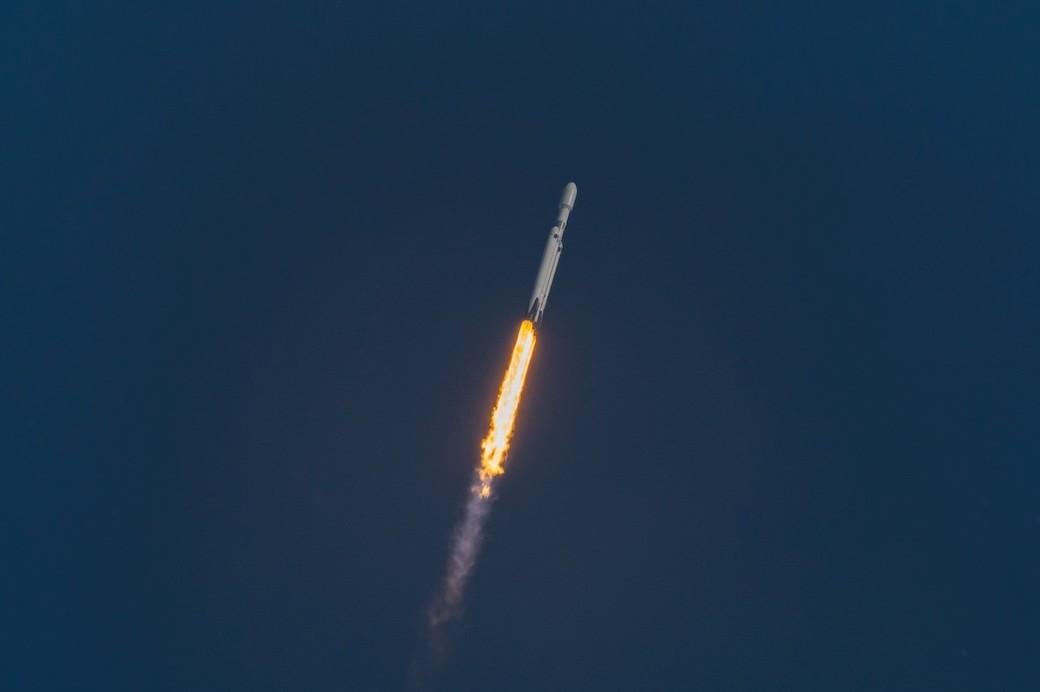Space Force Outlines New Acquisition Plan For NSSL Phase 3

The U.S. Space Force is laying out a new approach for national security space launches, using a “dual-lane” method to increase competition for initial launches.
Space Systems Command (SSC) on Feb. 16 released a draft request for proposals for National Security Space Launch (NSSL) Phase 3 ahead of a final request for proposals (RFP) expected later this year and first launches in 2024. The Space Force wants more potential vendors for the next phase, following the Phase 2 award to SpaceX and United Launch Alliance (ULA) in 2020.
The draft RFP outlines an initial “Lane 1” plan to use multiple firm fixed-price, indefinite-delivery indefinite-quantity contracts that are open to all bidders. Interested bidders will not be required to meet all NSSL orbits to qualify, with annual on-ramping opportunities for new providers. This section will cover fiscal 2025-34 procurements with a five-year base order plus a five-year option, SSC says.
Lane 1 is designed to serve more risk-tolerant space vehicles that can launch to orbits which can be met with commercial launches. Task orders for launch services will be competed on an annual basis, with the government able to order missions individually or in blocks, SSC says. Providers will have to propose launch prices that will include all support costs, and awards will incorporate mission assurance that is tiered as required for each mission.
The Lane 2 option will be more like the previous NSSL phase, with the government selecting two awardees. These firm fixed-price indefinite-delivery requirement (IDR) contracts will be awarded to providers that demonstrate the best value and can meet all NSSL orbit and mission capabilities, SSC says.
These contracts will have a five-year fiscal 2025-29 order period. The awards include missions that will require full assurance with certified launch vehicles that can go to more stressing orbits using higher performance launch systems and complex security and integration requirements, SSC says.
In an effort to broaden the potential pool of applicants for the IDR awards, the Space Force also plans to offer “Early Integration Studies (EIS)” for first-year orders. “EIS is a risk-reduction activity, the results of which inform the government on the compatibility between the launch vehicle and the spacecraft,” the draft RFP says.
“For first-time missions of a specific space vehicle and/or new entrant launch vehicle configuration, EIS is vital to identify the space vehicle’s mission unique requirements and assess the launch vehicle’s ability to meet space vehicle interfaces,” the Space Force notes, adding:
“Offerors interested in conducting EIS for missions anticipated to be ordered in the first year of the Phase 3 Lane 2 IDR contracts must either be an LSP [launch service provider]with a certified system or an LSP with an approved certification plan for your proposed launch system.”
A third option for companies interested in EIS missions is to submit a statement of intent to initiate a launch system certification plan, the Space Force adds.
ULA CEO Tory Bruno, in a statement to Aerospace DAILY, says the NSSL Phase 3 plans recognize space is a warfighting domain, and a block-buy approach effectively helps launch critical assets to combat space threats.
“It is well documented that block buys drive down costs, making our nation’s launches more efficient, effective and reliable,” Bruno says. “Block buys are also important to ensure the U.S. government has predictable and reliable access to launch, as well as providing stability to the industrial base. We commend the Space Force for continuing that approach and building off the success of Phase 2 as we move into this next phase.”

